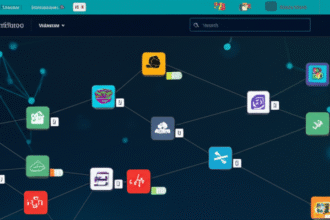In today’s fast-paced world, the realm of artificial intelligence (AI) and automation is transforming the landscape of business operations at an unprecedented rate. From simplifying tasks to enhancing decision-making processes, AI-driven tools are helping businesses streamline their activities and optimize their overall efficiency.
The Rise of AI in Business
AI technology is not a distant concept anymore; it has become a crucial component of modern business strategies. Companies leverage AI analytics to gain insights from vast data sets, automate routine tasks, and enhance customer experiences. Businesses of all sizes are adopting AI solutions, from small startups using chatbots to improve customer service to multinational corporations employing complex algorithms for predictive analytics.
Automation: Driving Efficiency
Automation is a critical aspect of AI implementation in businesses. It refers to the use of technology to perform tasks with minimal human intervention. This can lead to significant savings in time and operational costs. For instance, processes like invoice processing, data entry, and customer follow-ups can now be automated with AI-driven software, allowing employees to focus on more strategic activities.
The Benefits of AI and Automation
- Improved Efficiency: By automating repetitive tasks, businesses can streamline workflows and reduce errors.
- Enhanced Decision Making: AI provides data-driven insights that help leaders make informed decisions.
- Cost Savings: Automation reduces the need for manual labor, cutting operational costs significantly.
- Better Customer Interactions: AI can personalize customer interactions, leading to improved satisfaction and loyalty.
Case Studies: AI in Action
Companies across various sectors are praising the adoption of AI and automation:
- Retail: Major retailers use AI to analyze shopping patterns, optimize inventory, and improve customer service with chatbots.
- Healthcare: AI systems assist in predictive analytics for patient care and automate administrative tasks.
- Finance: Financial institutions deploy AI for fraud detection and risk management.
Challenges and Considerations
Despite its benefits, implementing AI and automation is not without challenges. Companies must navigate issues such as data privacy, regulatory compliance, and the ethical implications of using AI technologies. Additionally, employees may require training and support to adapt to these new systems.
Future Trends in AI and Automation
The future of AI and automation in business looks promising. Advances in machine learning and chatbot technologies are set to expand further. Organizations are expected to invest heavily in AI to enhance user experiences, improve efficiencies, and maintain a competitive edge in the marketplace.
Related Articles You May Like
- Latest Jobs Report: IT Trends
- Jobs Report: Future Tech Workforce
- Impact of Financial Technology on Markets
Conclusion: Embrace the Future
AI and automation are reshaping the business landscape. By embracing these technologies, organizations can improve efficiency, enhance customer experiences, and remain competitive. As we continue to evolve in this digital age, the potential for AI-driven innovations is boundless.








